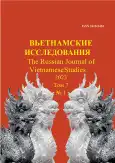Effects of financial contagion in Vietnam during the pandemic crisis
- 作者: Ovcharov A.O.1
-
隶属关系:
- Lobachevsky State University of Nizhny Novgorod
- 期: 卷 7, 编号 1 (2023)
- 页面: 27-40
- 栏目: Scientific researches
- URL: https://journal-vniispk.ru/2618-9453/article/view/134386
- DOI: https://doi.org/10.54631/VS.2023.71-119835
- ID: 134386
如何引用文章
全文:
详细
The article discusses the features of the spread of the COVID-19 pandemic in Vietnam in the context of the theory and methodology for identifying the effects of financial contagion. The Vietnamese economy in the 2000 demonstrated steady growth, which allowed minimizing many of the negative consequences of the pandemic. At the same time, the Vietnamese economy was exposed to financial contagion – the effects of the transmission of negative shocks from other countries and the subsequent spread between sectors of the national economy. These effects during the pandemic have been empirically confirmed. For this purpose, special tests and an extensive information base on the stock market were used. The results showed that Vietnam was exposed to pandemic shock from China, but was not a transmitter of financial contagion for other Asian countries. In addition, the article fixes the risks of contagion at the sectoral level – the most susceptible to contagion were industries such as trade, real estate and food.
作者简介
Anton Ovcharov
Lobachevsky State University of Nizhny Novgorod
编辑信件的主要联系方式.
Email: anton19742006@yandex.ru
ORCID iD: 0000-0003-4921-7780
Scopus 作者 ID: 56347535500
Researcher ID: AAH-6274-2019
D.Sc. (Economics), Professor, Institute of Economics and Entrepreneurship
俄罗斯联邦, Nizhny Novgorod参考
- Báo cáo Khảo sát. Tác ḍông của ḍai ḍich COVID-19 doanh nghịêp tao tác ḍông xả hôi. 2020. [Summary report of the survey of firms on the impact of COVID-19]. URL: https://drive.google.com/file/d/11CtHDA9L-QG7jiIrv3enjWw01Hme5V9H/view. (In Vietnamese)
- Chang, H.L., Su, C.W. (2010) The relationship between the Vietnam stock market and its major trading partners. TECM with bivariate asymmetric GARCH model. Applied Economics Letters, 17(13): 1279–1283. https://doi.org/10.1080/00036840902881892
- Dang Tam Hoang Nhat, Nguyen Nhan Thien, Vo Duc Hong (2022). Sectoral volatility spillovers and their determinants in Vietnam. Economic Change and Restructuring, 56 (1): 681–700. https://doi.org/10.1007/s10644-022-09446-9
- Dang, H., Giang, L. (2020) Turning Vietnam’s COVID-19 success into economic recovery: A job-focused analysis of individual assessments on their finance and the economy. IZA Discussion Paper, 13315. https://doi.org/10.2139/ssrn.3620630
- Dornbusch, R., Park, Y., Claessens, S. (2000) Contagion: Understanding how it spreads. World Bank Research Observer, 15 (2): 167–195. https://doi.org/10.1093/wbro/15.2.177
- Fry-McKibbin, R., Hsiao, C.Y., Tang, C. (2014) Contagion and Global Financial Crises: Lessons from nine crisis episodes // Open Economies Review, 25: 521–570. https://doi.org/10.1007/s11079-013-9289-1
- Ha Thanh Lam, Bui Van Huyen (2020). Impacts of COVID-19 outbreak on Vietnam’s foreign trade. Russian Journal of Vietnamese Studies, 4 (4): 27-36. https://doi.org/10.24411/2618-9453-2020-10031
- Huang, S. (2022) Do green financing and industrial structure matter for green economic recovery? Fresh empirical insights from Vietnam. Economic Analysis and Policy, 75: 61–73. https://doi.org/10.1016/j.eap.2022.04.010
- Jokipii, T., Lucey, B. (2007) Contagion and interdependence: Measuring CEE banking sector co-movements. Economic Systems, 31(1): 71–96. https://doi.org/ 10.1016/j.ecosys.2006.05.001
- Le Hai Binh, Lam Thanh Ha (2021). Vietnam Economy under the Impact of COVID-19. Russian Journal of Vietnamese Studies, 5 (4):45–70. https://doi.org/10.54631/VS.2021.54-45-70
- Matsuura, T., Saito, H. (2022) The COVID-19 pandemic and domestic travel subsidies. Annals of Tourism Research, 92:103326. https://doi.org/10.1016/j.annals.2021.103326
- Mazyrin, V.M. (2015) Ekonomika V'etnama na pod"eme: tendencii 2013–2014 gg. V'etnamskie issledovaniya [Vietnamese studies], 1(5): 182–207. (In Russian)
- Mazyrin, V.M. (2016) V'etnam: zony svobodnoj torgovli [Vietnam: Free Trade Zones]. Mirovaya ekonomika i mezhdunarodnye otnosheniya [World Economy and International Relations], 60 (3): 72–82. https://doi.org/10.20542/0131-2227-2016-60-3-72-82. (In Russian)
- Nguyen Nhan Thien, Nguyen Ha Son, Ho Chi Minh, Vo Duc Hong (2021). The convergence of financial inclusion across provinces in Vietnam: A novel approach. PLoS ONE, 16(8): e0256524. https://doi.org/ 10.1371/journal.pone.0256524
- Nguyen, C., Bhatti, M.I., Henry, D. (2017). Are Vietnam and Chinese stock markets out of the US contagion effect in extreme events? Physica A: Statistical Mechanics and its Applications, 480: 10–21. https://doi.org/10.1016/j.physa.2017.02.045
- Nguyen, H.C. (2018) Empirical evidence of structural change: The case of Vietnam’s economic growth. Journal of Southeast Asian Economies, 35 (2): 237–256. https://doi.org/10.1355/ae35-2h
- Nguyen, T.C., Castro, V., Wood, J. (2022) A new comprehensive database of financial crises: Identification, frequency, and duration. Economic Modelling, 108: 105770. https://doi.org/ 10.1016/j.econmod.2022.105770
- Rost VVP V'etnama v 2022 godu stal maksimal'nym s 1997 goda [Vietnam's GDP growth in 2022 was the highest since 1997]. Retrieved on 20.03.2023 from URL: https://www.interfax.ru/world/879142. (In Russian)
- Seth, N., Panda, L. (2018) Financial contagion: Review of empirical literature. Qualitative Research in Financial Market, 10 (1): 15–70. https://doi.org/ 10.1108/QRFM-06-2017-0056
- Terskih, M.A. (2022) Pandemiya COVID-19: opyt V'etnama [The COVID-19 pandemic: the experience of Vietnam]. Yugo-Vostochnaya Aziya: aktual'nye problemy razvitiya [South East Asia: Actual problems of Development], vol. 1, 1(54): 206–214. https://doi.org/10.31696/2072-8271-2022-1-1-54-206-214. (In Russian)
- Trigubenko, M.E. (2018) Ekonomika V'etnama segodnya: sostoyanie i real'nye ugrozy [The economy of Vietnam today: state and real threats]. Ekonomika i upravlenie [Economics and management], 3 (149): 26–29. (In Russian)
- Vu Khoa, Nguyen Dinh Tuan Vuong, Vu Thanh Tu Anh, Nguyen Anh Ngoc (2022). Income shock and food insecurity prediction Vietnam under the pandemic. World Development, 153: 105838. https://doi.org/ 10.1016/j.worlddev.2022.105838
- Wang, K.M. (2013) Did Vietnam stock market avoid the “contagion risk” from China and the US? The contagion effect test with dynamic correlation coefficients. Quality & Quantity, 47: 2143–2161. https://doi.org/ 10.1007/s11135-011-9647-2
- Wang, K.M., Lai, H.C. (2013) Which global stock indices trigger stronger contagion risk in the Vietnamese stock market? Evidence using a bivariate analysis // Panoeconomicus, 60 (4): 473–497. https://doi.org/ 10.2298/PAN1304473W
- Xu hướng đô thị hóa ở Việt Nam giai đoạn 2021–2030 và một số hệ lụy [Urbanization trends in Vietnam 2021–2030 and some consequences]. 26.12.2019. URL: http://ncif.gov.vn/en/Pages/NewsDetail.aspx?newid=21873#. (In Vietnamese)








